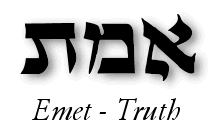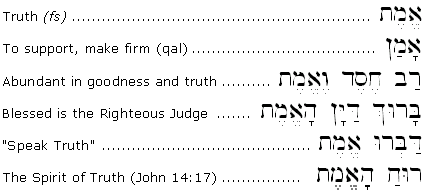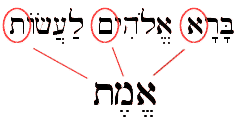|
|
|||||||||||||||||||||
 |
|||||||||||||||||||||
|
Learn Hebrew |
|||||||||||||||||||||
|
Hebrew Word of the Week |
|||
 |
|||
|
When I studied philosophy in graduate school, I took some courses in "epistemology," or the theory of knowledge. These courses would discuss things like "what can we know?" "what is truth?" and the like. In the Greek/Western conception, truth (aletheia) is a property generally ascribed to linguistic states: a proposition p is true if and only if p obtains in the (empirical/observable) world. That is, truth has to do with some sort of correspondence between our thinking (as expressed by language) and states of affairs in the world.
In other words, God created reality "to do" (la'asot), which has come to be interpreted by the sages as meaning that it is our responsibility, as God's creatures, to complete the "doing" of His Creation (tikkun Olam). Truth is about doing, not being... But notice that if we remove the letter Aleph from the word, we are left with the word "dead" (i.e., met: מֵת), the opposite of life (i.e., chayim: חַיִּים). The letter Aleph is the ineffable letter that represents oneness and preeminent glory of God. Therefore, if we attempt to ignore or suppress God in our understanding of truth, we end up with death. And since Yeshua told us, "I am the way (הַדֶּרֶךְ), the truth (הָאֱמֶת), and the life (הַחַיִּים); no one comes to Father apart from me" (John 14:6), those who deny His reality are in a state of spiritual death... We simply cannot know the meaning of life apart from the Person and Glory of Yeshua our Messiah! |
|
|
|
Truth is Personal |
|
The LORD Yeshua our Messiah is called the Aleph and the Tav (הָאָלֶף וְהַתָּו), "the first and the last" (הָרִאשׁוֹן וְהָאַחֲרוֹן). These are clearly divine titles that exclusively belong to YHVH (Isa. 41:4, 44:6, 48:12; Rev. 1:1,17-18; 22:13). Indeed, Pilate's famous question, "What is truth?" is a category mistake, since truth is not about "what" but about "Who." That is, truth is not something objective and static, a thing to be known and studied from a distance. No. Truth is up-close and personal. Understood in this way, truth is a way of living, a mode of existence, and inherently relational. It is a mistake to think of God as an "object" to be studied. No, God is not some static thing but rather a dynamic and forceful Person. Unlike the Greek philosophers who tended to regard God as little more than a "machine" (deus ex machina) or device that caused the universe to "get going," the LORD God of Israel is intensely personal, feeling, emotional, compassionate, angry, and so on. The Hebrew view of God is that of a Living Person, a Spoken Word, and a Fiery Breath that broods over the events of the physical world. |
 |
|||||||
 |
|||||||
|
These are the things that ye shall do; |
|||||||
|
|
|
Hebrew for Christians |
|||
|
|||

